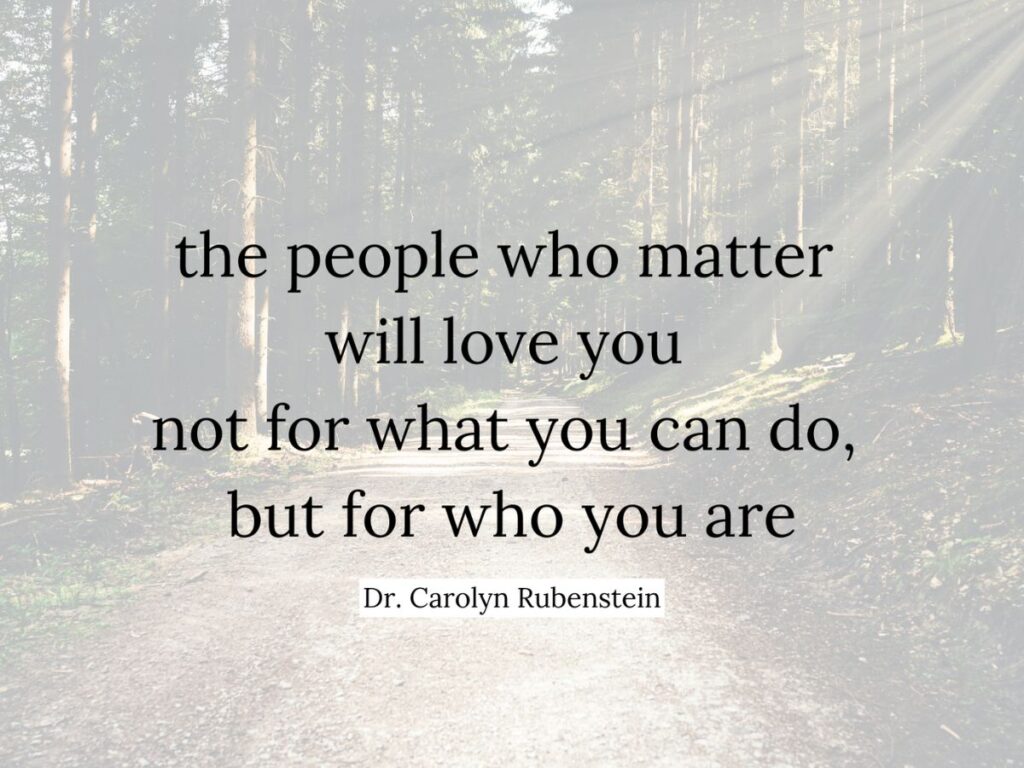We’ve all heard the phrase “You are enough”—from self-help books, friends, or maybe even from me. We’re encouraged to tell ourselves this truth and believe it: You are enough—without conditions, without contingencies.
But what does that really mean? It means you aren’t defined by the tasks you complete, by the emotions of others, by a number on the scale, or by the bags under your eyes. It’s a message of self-acceptance, a reminder that you, just as you are, are worthy.
And yet, even when we say it and believe it wholeheartedly, there’s still a truth we can’t escape: there will always be people for whom we are not enough.
Recognizing the Cost of Overextending Yourself This pressure to conform to others’ expectations can eat away at our sense of self-worth. You might find yourself saying “yes” when you really want to say “no,” all because you don’t want to let someone down. You may drop everything to help a friend, take on extra tasks at work, or overextend yourself in relationships—all in an effort to be “good enough” for those around you.But here’s the catch: no matter how much you give or how hard you try, you’ll never be enough for everyone. And the more you chase this unattainable standard, the more drained, unfulfilled, and disconnected from yourself you’ll feel. Over time, trying to meet everyone else’s expectations can lead to burnout, resentment, and a growing sense of inadequacy.I’ve been there, and I know the toll it can take. We give and give, hoping that by being “good enough” for others, we’ll finally feel good enough for ourselves—but it never works that way.
Facing the Reality: You Won’t Be Enough for Everyone
Not long ago, I caught myself falling back into that old pattern. There were projects to complete, friends who needed support, and clients who wanted more of my time. I felt the weight of all these demands, and despite knowing better, I found myself trying to meet everyone’s expectations.
I silenced my inner voice that said, This isn’t sustainable. I convinced myself it was just easier to say yes than to deal with the discomfort of letting people down. But deep down, I knew I wasn’t doing myself any favors.
That’s when I decided to sit with this feeling and really explore it. What would happen if I stopped trying to be enough for everyone? What would it look like to let go of the need to meet others’ expectations?

Finding Freedom in Letting Go of External Validation
The answer changed everything for me. I realized that not being enough for some people was actually a gift. It was a way to clarify who and what really matters in my life.
Accepting that I won’t be enough for everyone brought me a sense of peace I hadn’t expected. It didn’t diminish my sense of self-worth; in fact, it strengthened it. I became more grounded in who I am, and I stopped chasing external validation. I let go of the need to please everyone and found freedom in being enough for myself.
This shift allowed me to invest more deeply in the relationships that truly matter—the ones where I’m valued for who I am, not for what I can do. And for the first time in a long time, I felt truly liberated.
The Power of Being Enough for Yourself
Now, I want to invite you to do the same. What would it look like if you stopped trying to be enough for everyone? How would your life change if you released the need to meet others’ expectations and instead embraced the fact that you are enough as you are?
I’m not asking you to drop all your responsibilities or to stop caring for others. But I am encouraging you to reflect on where you might be giving more than you need to—where you’re trying to be “good enough” for others at the expense of your own well-being.
It’s time to let go of the pressure to please everyone and focus on being enough for yourself. When you do, you’ll find that the people who matter will love you not for what you can do, but for who you are.
Your Challenge: Release the Pressure and Embrace Your Enoughness
So, here’s my challenge for you this week:
Take a moment to reflect on where in your life you’re overextending yourself to meet someone else’s definition of “good enough.” Write down those situations, and then ask yourself: Is this truly serving me?
From there, make a conscious decision to let go—just a little bit. Say no where you need to, and remind yourself that it’s okay to not be enough for everyone.
And for those people for whom you are enough? Be all in. Give them your best self, but from a place of wholeness, not depletion. You are enough, exactly as you are.
Take good care of yourself,
Dr. Carolyn


